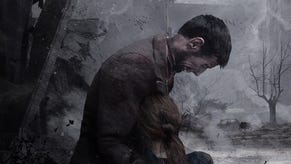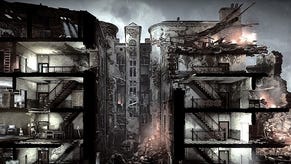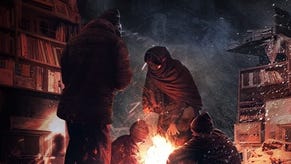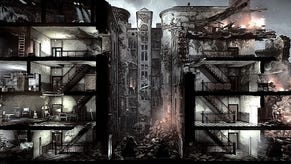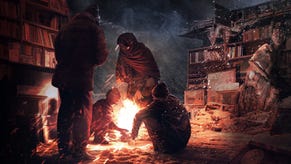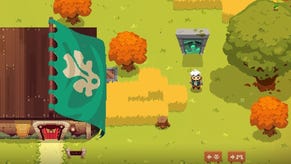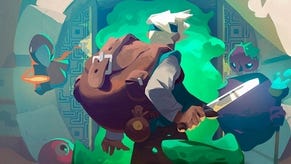This War of Mine review
The art of war.
It hasn't been a good week.
Downstairs, Pavle lies crumpled on the concrete floor, doubled over in agony at a wound we don't have the bandages to dress, and crippled by a four day hunger that a single can of food could barely touch.
In the sitting room, sunk into a makeshift sofa touched by grey sunlight, Bruno darkly contemplates what it took to get that can, having last night broken into a house on the edges of this war-torn city and stolen all he could while its elderly inhabitants watched on, helpless, in horror.
Katia, the third inhabitant of this dilapidated dwelling, stands at the door, desperately bartering with a neighbour for another scrap of food that would mean another day of survival in this mundane hell.
This War of Mine isn't like other war games. The first gunshot you hear won't have the blockbuster boom of a pistol being fired off in Call of Duty or Battlefield - it'll likely be a thin, hollow crack that pierces through the dead of night - but it'll carry much more weight, the result of your own panicked scavenge hunt for more resources or, worse, from the barrel of one of the bandit patrols that work their way across town.
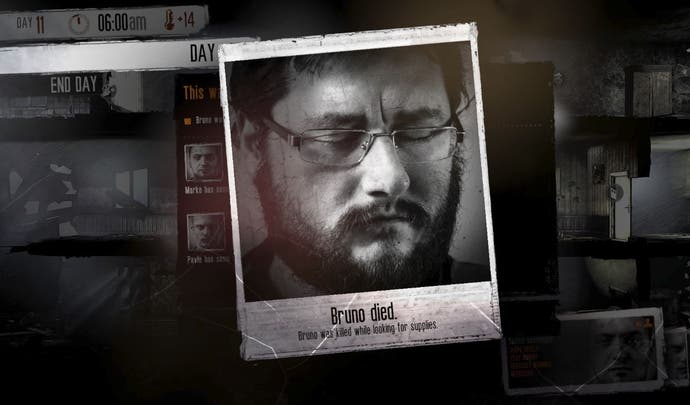
Polish developer 11 bit Studio's new game is The Sims by way of 90s Sarajevo, in which you babysit survivors of an unnamed war. You're tasked with feeding them, ensuring they get a good night's rest and looking out for their physical as well as mental health - something that's already as fractured and fragile as the mortar-struck walls they live within. It shares some traits with The Sims, but it certainly doesn't share the blithe cheeriness. This is a pointedly grim game.
Like Papers, Please, This War of Mine's systems are designed to push you towards moral quandaries, where you're trapped by basic human needs, and shown how they can so easily corrupt otherwise upstanding people. And, as in Lucas Pope's bleak puzzler, it's a game in which the systems are neatly engineered and well-oiled, whirring away with a hypnotic rhythm that slowly draws you in. This is indeed a grim title, but it's one whose horror is occasionally obscured by truly compelling gameplay.
By day you'll make house, instruct your randomly selected group of survivors to explore new floors, construct makeshift beds and upgrade workbenches with whatever scraps you have to hand. Survivors come with their own slim biographies and associated perks - Pavle was once a promising athlete who retains his ability to sprint, Bruno a former TV chef who's subsequently handy behind a stove - and they all share a veneer of desperation, stripped as they are of all hope and identity until they're just fiends clawing at rubble in search of one more meal.
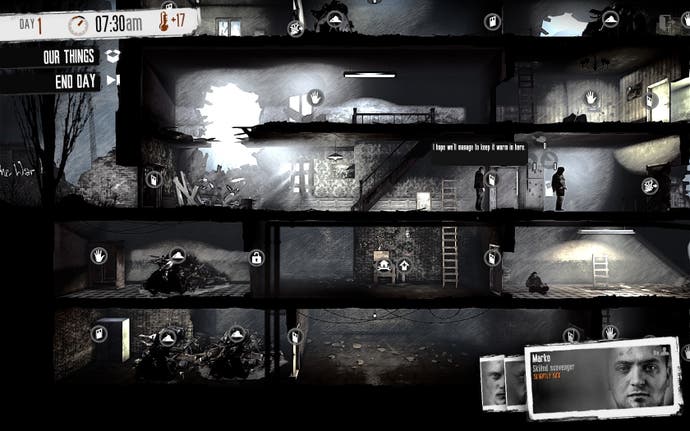
By night, you're asked to choose one of your survivors to set out on a scavenger hunt in a different part of town. Each comes its own risks and rewards - an abandoned supermarket may have a surplus of the food you so keenly require, but it'll also be coveted by other bandits and raiders. Other risks weigh heavier still. You can enter an occupied house and ignore the inhabitants who implore you to stop, filling your pockets with ill-gotten goods, but your deed may well cripple your character with a depression that'll render them useless for an entire day.
The clean split between day and night creates the steady metronome that keeps you pushing through This War of Mine. Each cycle becomes a gentle wave of resource management that slowly swells to something more traumatic: illnesses spiral out of control when left unchecked, empty stomachs can never be quite satisfied, and while you'll start off in the thin warmth of late summer, over time the cold of winter slowly creeps in. Deaths are as inevitable as the changing seasons, and so choking are the requirements of your subjects that it's a fact of life that can only ever really be prolonged, rather than avoided entirely.
There's grace amidst this misery, though. This War of Mine's a cleanly illustrated game, its vision of a city in crisis drawn with a pencil and paper aesthetic that brings to mind Joe Sacco's comic-book journalism, and it's matched by a different sort of tidiness elsewhere. The stealth sections by night are tightly designed, your player's vision cones wrapping dynamically around the line of sight, while the nearby footsteps of a fellow scavenger come to life through small red on-screen pulses. The economy that props up This War of Mine is lavish in its arrangement too - a system where coffee beans are traded for diamonds when neighbours come knocking at your door, and where you're consciously ticking off the checklist for everyday survival.

The only problem is that 11 bit Studios are often victims of their own efficiencies as developers. There are moments of real horror in This War of Mine - stripping that elderly couple of all that they possess, or the hollow relief you feel when a soldier steps out of your way to abuse a stricken hostage - that linger with you, but it's all too clean to ever truly hit home.
Perhaps the problem is my own, and maybe I'm too content to morbidly tinker with my survivors to push them towards another miserable day. This War of Mine is a game whose simple message - that war is hell, and that we're all capable of being sucked into its moral depths - might be slightly compromised by its strengths as a game, but at least it's a message carried with a great deal more conviction than other, more bombastic portrayals of conflict. That, for certain, is something to be thankful for.


